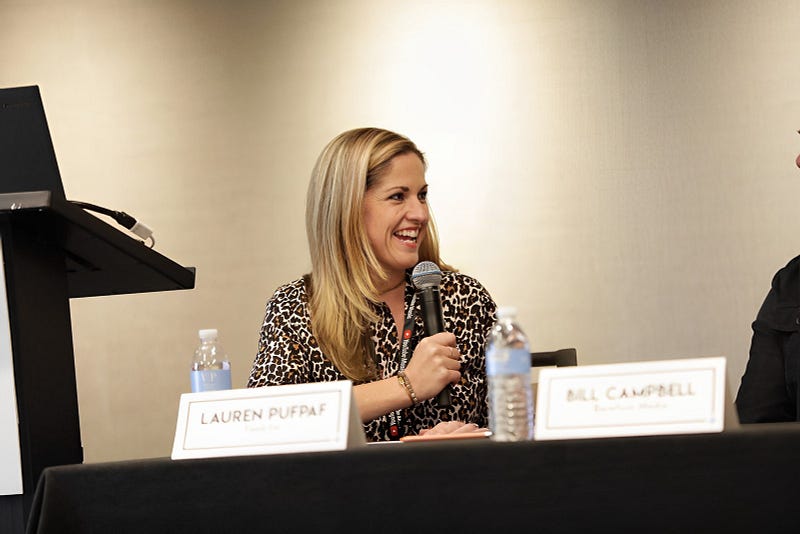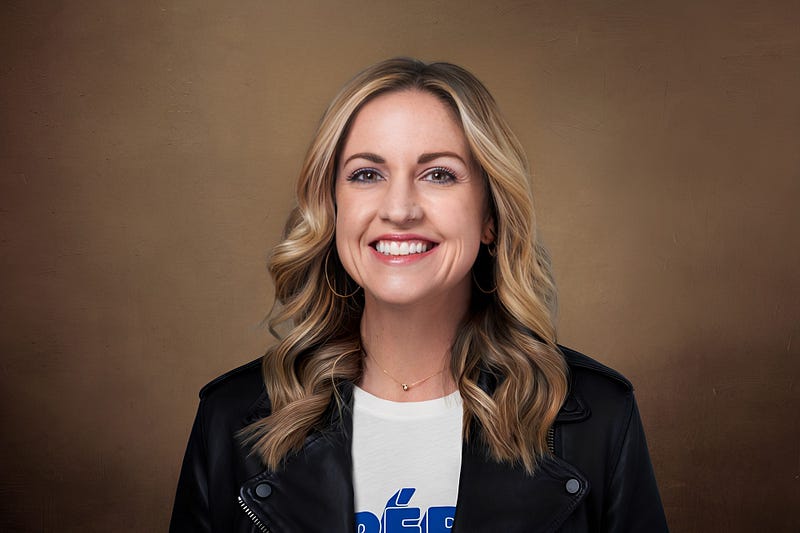Leaders today are required to focus on adaptability and lead their teams to be nimble as well. Having a high AQ means that you are proactive, flexible, curious, resourceful, and champion open-minded problem solving. With all the uncertainty in the market right now, I’ve been working closely with my team to make sure we are highly adaptable so that we can thrive even in the face of external pressures.
We are living in the Renaissance of Work. Just like great artists know that an empty canvas can become anything, great leaders know that an entire organization — and the people inside it — can become anything, too. Master Artists and Mastering the Art of Leadership draw from the same source: creation. In this series, we’ll meet masters who are creating the future of work and painting a portrait of lasting leadership. As part of this series, we had the pleasure of interviewing Lauren Pufpaf.
Lauren Pufpaf is Co-founder and President/COO of Feed Media Group (FMG). She’s been building businesses in the Bay Area for 20 years, and launched FMG to the world 8 years ago. Lauren focuses on people growth alongside revenue growth and has a lifelong passion for music. Whether she’s DJing a party or helping a business with their music strategy, she believes intensely in the power of music to motivate and heal.
Thank you for joining us. Our readers would enjoy discovering something interesting about you. What are you in the middle of right now that you’re excited about personally or professionally?
Thanks for having me! On the professional front, I am very excited about the growth we are seeing in multiple new verticals at the moment. As our business expands this quarter, we are taking some time to focus on strategic category design to ensure smart and intentional expansion.
Personally, I just bought a new DJ mixer (Rane One) and am excited to get back out into the world and play some live sets this year. Between the pandemic and a toddler, I took a few years off from playing parties and clubs, but I’m coming back!
We all get by with a little help from our friends. Who is the leader that has influenced you the most, and how?
I’ve learned a lot from leaders who illustrated behaviors and styles that were completely ineffective. Whether it was using fear and stress to motivate teams or rewarding in-fighting and politicking, I consistently kept notes on what I DID not want to emulate. Positively, I have learned a lot from Joanna Drake over the years. When we worked together at Current TV, I saw her navigate change deftly with a large, very diverse group of creatives and visionaries. Her calmness and ability to focus on the upsides of turmoil was an inspiration.
Sometimes our biggest mistakes lead to our biggest discoveries. What’s the biggest mistake you’ve made as a leader, and what did you discover as a result?
The biggest mistakes I’ve made have been related to team member performance and waiting too long to make a change. When you realize someone is not the right fit, you have to move quickly. When you let things linger too long, you impact both performance and morale. When I’ve tolerated bad behavior or poor performance, I realized it was sending the signal to the rest of the team that it’s ok to consistently act against our core values or miss targets. Companies are more like sports teams than family. You bring together a group of talented individuals to reach a common goal. But, if someone is not the right fit, you accept it quickly and do the right thing for everyone involved.
How has your definition of leadership changed or evolved over time? What does it mean to be a leader now?
As I speak with other leaders, I find that there is often a common path or evolution that we experience. As an early leader, you are setting goals and providing the structure and resources for people to hit those goals. And, over time you realize how valuable the EQ (emotional intelligence) and AQ (adaptability quotient) aspects of leadership are.
People need to be heard and, as a leader, you are responsible for understanding each individual’s growth path and strengths. Your job is to facilitate the team stability and dynamics to make sure the sum is greater than the parts. Aligning disparate streams of work, personalities, and career paths while setting and hitting aggressive goals is really the magic of being a great leader now. You work WITH your teams to build the ecosystem to work hard and thrive together.
Success is as often as much about what we stop as what we start. What is one legacy leadership behavior you stopped because you discovered it was no longer valuable or relevant?
Over the years I have found that carrying all the stress of the organization and trying to shield the teams from it can be counterproductive. When you suppress powerful emotions, they tend to take on a life of their own and eventually you get burnt out. You have to prioritize your own wellbeing and that of your team if you want to future-proof your company.
What is one lasting leadership behavior you started or are cultivating because you believe it is valuable or relevant?
I’ve been learning to embrace polarities and the use of “both-and” thinking vs. “either-or” thinking. Polarities are also called dilemmas or paradoxes and represent a pair of interdependent alternatives. You can’t ignore either alternative without serious negative consequences. We experience polarities every day including work-rest, structure-flexibility, stability-change, or revenue growth-margin. If you can supplement traditional problem solving with “both-and” thinking, you are able to recognize both the pros and cons of a given alternative and can maximize the overall outcome.
What advice would you offer to other leaders who are stuck in past playbooks and patterns and may be having a hard time letting go of what made them successful in the past?
First and foremost, you have to WANT to change. Without the desire to move forward, nothing will happen. Next, it’s about implementing change one small step at a time. I love James Clear’s approach in his book Atomic Habits. In order to change your behavior permanently, you focus on identity, not actions. First, decide the type of leader you want to be, then prove your identity to yourself with small wins throughout the course of the day.
Many of our readers can relate to the challenge of leading people for the first time. What advice would you offer to new and emerging leaders?
I’ve gotten so much value from working with coaches over the years. Even if your organization doesn’t support it financially, there are now many virtual options that are more affordable. Working with a pro who can give you the frameworks and mental models to up level your game is always worth it.

Based on your experience or research, what are the top five traits effective leaders exemplify now? Please share a story or an example for each.
- Flexibility and Adaptability
Leaders today are required to focus on adaptability and lead their teams to be nimble as well. Having a high AQ means that you are proactive, flexible, curious, resourceful, and champion open-minded problem solving. With all the uncertainty in the market right now, I’ve been working closely with my team to make sure we are highly adaptable so that we can thrive even in the face of external pressures.
2. Growth Mindset
When you believe that your talents and skills can be developed through input from others and good strategies, you have a growth mindset. This helps you stay invigorated when the inevitable happens and new challenges come your way. I’ve found John C. Maxwell’s famous “Law of the Lid” theory to be true. The top-level leader (the lid) drives growth and improvement in the organization and there is a natural leveling that takes place just below the leader’s level of effectiveness. The higher the lid, the greater the team. Therefore, it is imperative that leaders constantly work to improve and learn to up level their skills to bring the organization along with them.
3. Integrity
Integrity in the workplace is about honesty, ownership, and having strong principles. Taking responsibility for your actions and being accountable for your words and deeds is core to being an effective and inspiring leader. One of our core values at Feed Media Group is “Own It”. When you do what you say you will do as a leader, your team will trust you to follow through with the best possible intentions for all involved.
4. Authenticity
I truly believe you have to be real and genuine if you want to lead effectively. Personally, I am inspired by leaders who are honest, willing to roll up their sleeves whenever it’s needed, and are comfortable being themselves — all while making room for others. Self awareness and transparency with teams can go a long way in creating true rapport and long-lasting relationships.
5. Inclusivity
It is so critical to create a sense of belonging and safety amongst your teams. When people feel supported to share thoughts and opinions on challenges and opportunities (even if they are unpopular), the quality of the dialogue and the ultimate outcome is always improved.
American Basketball Coach John Wooden said, “Make each day your masterpiece.” How do you embody that quote? We welcome a story or example.
I love my early morning routine! I start with 20 minutes of meditation, then make sure to work in movement every day. Cycling, boxing, and kettlebells are my favorite right now, but I try to switch up modalities to keep it fresh. Taking that one hour for myself before the calls, Zooms, drop offs, and emails begin really uplifts my attitude and gets my head on straight. My days are insanely packed most of the time, but I always try to carve out a few minutes for walks and fresh air. When I am able to step away from a challenge and let my subconscious work through ideas, I come up with new solutions and fresh perspective.
What is the legacy you aspire to leave as a leader?
The greatest joy for me in my career has always been helping others achieve more and realize their potential. I hope to have touched lives positively and encouraged people to lift each other up.
How can our readers connect with you to continue the conversation?
Drop me a line anytime: [email protected] or reach out on LinkedIn https://www.linkedin.com/in/laurenpufpaf/
Thank you for giving us the opportunity to experience a leadership master at work. We wish you continued success and good health!


